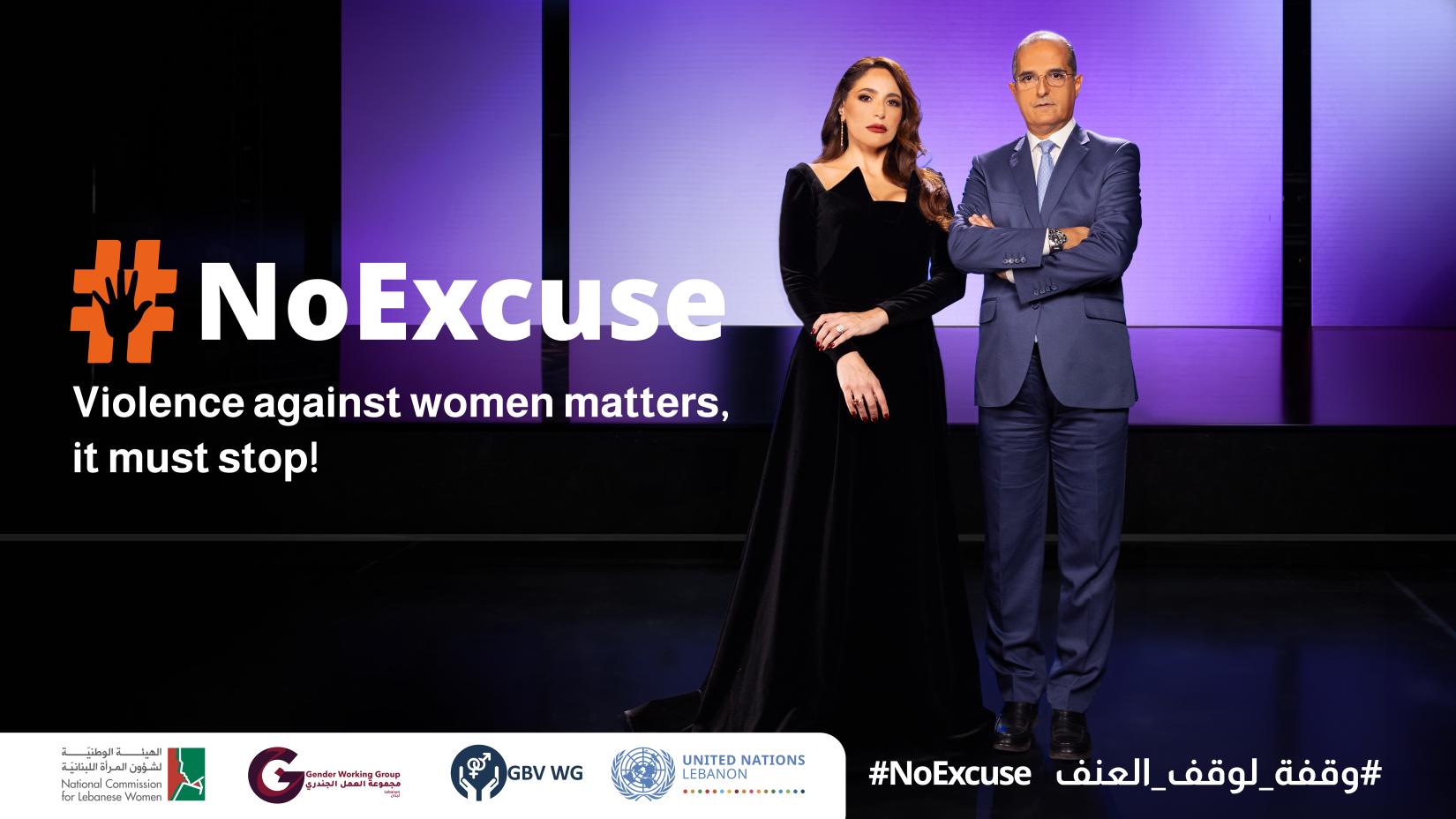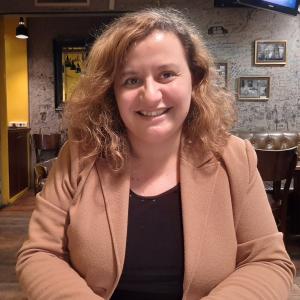The 16 Days of Activism Campaign against Gender-Based Violence kicks off in Lebanon as violence increases amid current multi-layered crisis
24 November 2023
- Beirut, 25 November 2023 – The United Nations (UN) system in Lebanon in partnership with the National Commission for Lebanese Women (NCLW) have come together to kick off the international campaign on 16 Days of Activism against Gender-based Violence to galvanize efforts to prevent and ultimately end the scourge of violence against women and girls, which is escalating amid the current multi-layered crisis. The campaign runs from 25 November, the International Day for the Elimination of Violence against Women, until 10 December, International Human Rights Day.

Violence against women and girls remains one of the most prevalent and pervasive human rights violations in the world. Globally, an estimated 736 million women – almost one in three – have been subjected to physical and/or sexual intimate partner violence, non-partner sexual violence, or both at least once in their life.[1] There are many different forms of violence against women—physical, sexual, psychological and economic. Violence against women has far-reaching consequences for women, their children, and society as a whole. Women who are subjected to gender-based violence suffer a range of health problems, and their ability to earn a living and to participate in public life is diminished. Their children are significantly more at risk of health problems, poor school performance and behavioral disturbances.
In Lebanon, women and girls are increasingly facing gender-based violence (GBV) at home, at work and in the public sphere. In 2020, 43 per cent of women and 30 per cent of men reported witnessing violence or knowing a woman who had experienced violence[2]. Preventing violence against women and girls requires long-term, concerted efforts and a multidisciplinary approach that includes raising awareness on the negative consequences of violence against women; addressing the root causes of the problem by changing discriminatory social norms and gender stereotypes through the engagement of all of society; empowering women and girls in the economic, political and social spheres to enhance their resources and skills and strengthening access to justice for women and girls survivors of violence and ending impunity for perpetrators of violence against women and girls.
This year, the UN, Gender Working Group (GWG), Gender-Based Violence Working Group (GBV WG) and NCLW are propelling the global campaign with a national call to action to address the increased risks of gender-based violence, including in times of crisis. Based on the global theme, UNiTE! Invest to prevent violence against women and girls, focuses on the importance of financing strategies to stop violence from occurring in the first place.
“This global initiative serves as a powerful reminder that it is our duty to come together and cultivate a safer, more inclusive world for everyone. We are steadfast in our conviction that no individual should ever experience violence or discrimination based on their gender. We are committed to tirelessly working at all levels to guarantee that each woman and girl has the chance to live a life devoid of fear and to never give up in our battle against violence. By joining forces, we can forge a future where hope prevails over despair, and where compassion and unity lay the foundation for a world where every person is cherished and esteemed,” said Claudine Aoun, President of the National Commission for Lebanese Women.
Bearing in mind that GBV services are lifesaving in situations of peace and even more so in times of crisis, the campaign will raise awareness of the struggles of women and girls in these challenging times and draw attention to how the Government of Lebanon and donors can ensure that gender-based violence is prioritized in annual and multi-year planning and funding.
"Gender-based violence is not only a human rights violation but is also damaging to society as a whole,” said UN Special Coordinator for Lebanon Joanna Wronecka. “As Lebanon faces multiple crises, most recently the risk of conflict, women and girls have the right to be safe and protected. Women should also be empowered to use their full potential and to play leading roles in contributing to their country’s wellbeing, peace and security and sustainable development."
Coordinated by UN Women, the campaign includes social media messaging over the course of the 16 days, with the #NoExcuse and #وقفة_لوقف_العنف hashtags, which aims at drawing attention to the needs of women and girls in all their diversity. The campaign’s main visual will be hanged up on NCLW’s building façade, throughout the 16 days.
The campaign will include a video featuring international Lebanese artist Abeer Nehme and news anchor and university professor Yazbek Wehbe and social media posts calling on national institutions, humanitarian partners and policymakers to prioritize gender and GBV risk-mitigation strategies in ongoing emergency planning and preparedness. It also asks for the support of community leaders and all women, men and girls in advocating for the protection of women and girls from violence, at all times, including in times of conflict and crises.
"As we continue to advocate for peace in these difficult times, we also prioritize gender-based violence in our ongoing emergency preparedness and response plans to help prevent and curb the deliberate violence against women and girls in these times of distress and heightened vulnerability” commented Imran Riza, United Nations Deputy Special Coordinator, UN Resident and Humanitarian Coordinator for Lebanon.
“Throughout these 16 days of activism, we call for increased investment in the prevention and protection of women and girls from the scourge of violence. This is crucial to help forge a path where every woman and girl can live free from fear, discrimination, and violence," he stated.
The international 16 Days of Activism against GBV campaign originated from the 1991 first Women’s Global Leadership Institute as a means to raise awareness and increase momentum to ending violence against women and girls worldwide. The UNITE to End Violence against Women initiative, launched in 2008 under the leadership of the UN Secretary-General, supports the civil-society-led 16 Days of Activism against Gender-based Violence campaign around the world.
*** END ***
_______________________________________
The United Nations system in Lebanon comprises 26 agencies, funds and programmes, as well as a peacekeeping mission, a political mission, and a regional commission that cover a broad spectrum of peacekeeping, political, development, human rights, and humanitarian work in Lebanon. The United Nations supports Lebanon to promote the country’s long-term peace and security, development, and human rights priorities.
The National Commission for Lebanese women (NCLW) is an official institution established by law at the Presidency of the Council of Ministers in 1998 with the aim of promoting the status of women and ensuring equal opportunities for women and men. Its General Assembly is composed of personalities known for their activities related to women’s affairs and is chaired by the woman delegated by the President of the Republic. The Commission carries out consultative functions at the Presidency of the Government and public administrations and institutions, as well as liaison and coordination functions with various administrations, institutions, public, community and civic organizations, and Arab and international organizations. The Commission also performs various executive functions, including the formulation of strategies and plans.
The Gender Working Group (GWG) in Lebanon operating under the Protection Sector, is co-chaired by the Ministry of Social Affairs (MoSA), UNFPA and UNHCR and is comprised of over 40 national and international NGOs/ CSOs, women-led and women rights organizations. Its aim is to ensure effective GBV prevention, response and risk mitigation programs are implemented by all GBV actors in Lebanon. Through monthly GBV coordination meetings, the GBV WG regularly assesses and analyzes information and data on the legal and socioeconomic environment in Lebanon to understand and address GBV risks, consequences and ultimately the root causes of GBV in the country informing the sector’s response strategies and advocacy actions.
The Gender Working Group (GWG) in Lebanon, chaired by UN Women and UNDP is a strategic forum and advocacy platform to promote gender equality and the integration of gender considerations in humanitarian-development-peace (HDP) actions of the United Nations and their partners in Lebanon. The GWG regularly convenes both international and national actors from across sectors to facilitate action on gender equality and women’s rights. The Gender Working Group is made up of 91 members (UN agencies: 20, INGOs: 32, and NGOs: 39); 15 member states collaborate with the group in an observatory status capacity. This group is complementary to the Gender Donor Working Group, chaired by the Government of Canada in Lebanon.
Media contacts:
Roula Rached, Communications and Advocacy Specialist, UN Women, phone number: +961 70351088
Micheline Elias Massaad, NCLW Executive Director, phone number: +961 3 452 570
Jumanah Zabaneh, Programme Management Specialist and Gender Working Group Co-Chair, UN Women, phone number: +961 3 498317
Sophie Etzold, Gender-based violence Coordinator, UNHCR, phone number +961 70 11 3293
[1] UN Women. 2023. “Violence against women: Facts and figures”. 21 September.
[2] https://arabstates.unwomen.org/en/digital-library/publications/2023/08/gender-statistical-profile-lebanon-2023




